中考英语语法突破第 8 讲 动词的时态和语态
文档属性
| 名称 | 中考英语语法突破第 8 讲 动词的时态和语态 |

|
|
| 格式 | zip | ||
| 文件大小 | 104.6KB | ||
| 资源类型 | 教案 | ||
| 版本资源 | 通用版 | ||
| 科目 | 英语 | ||
| 更新时间 | 2013-01-09 19:03:54 | ||
图片预览

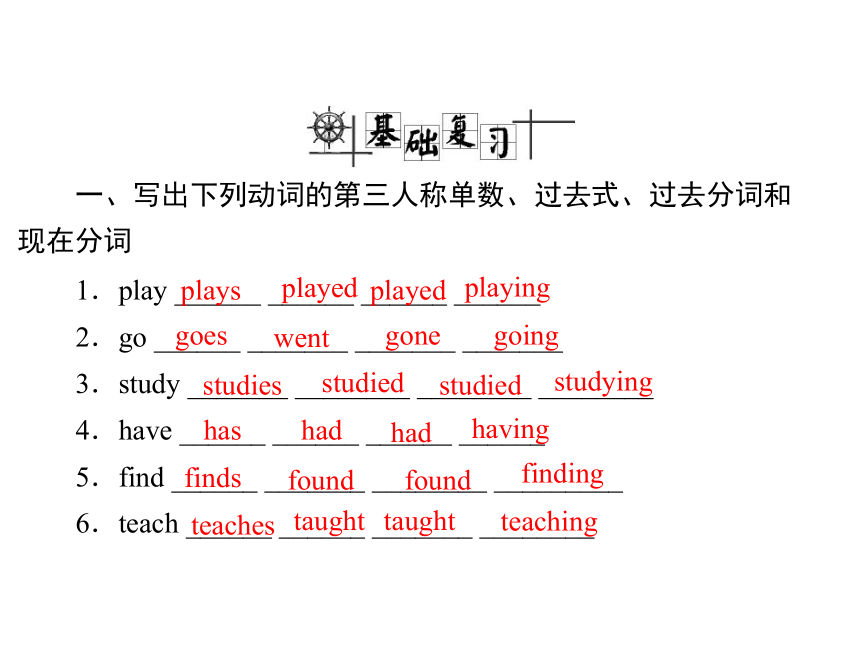
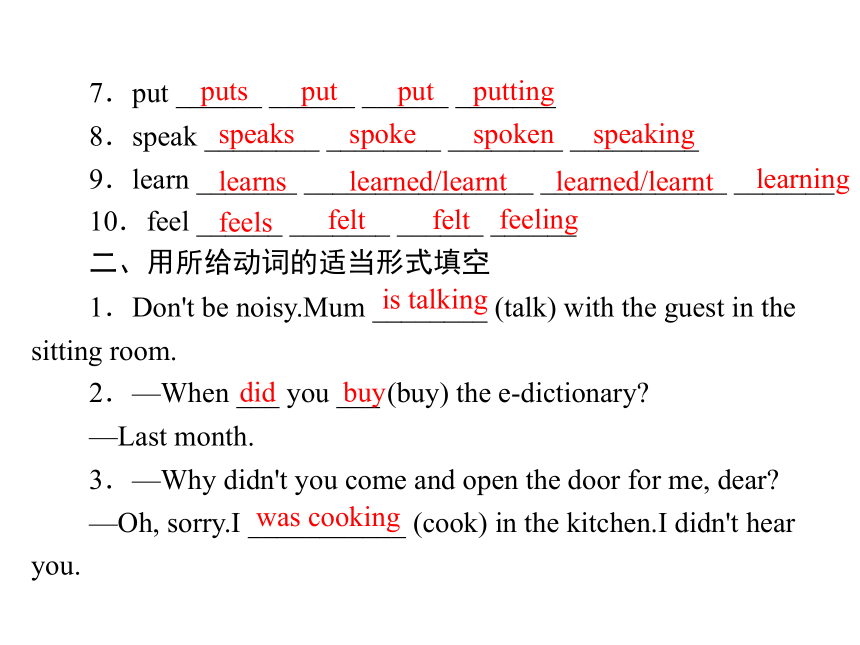
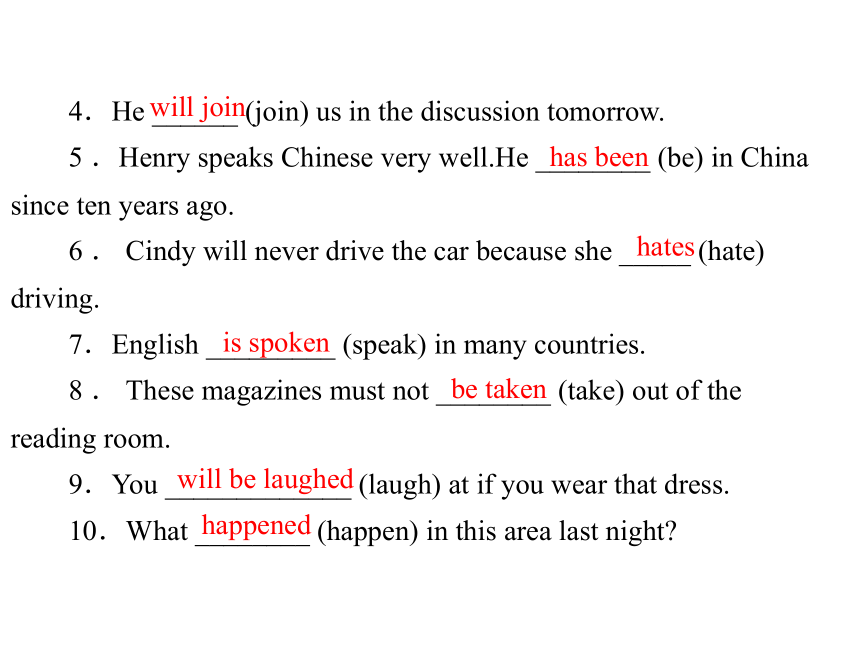
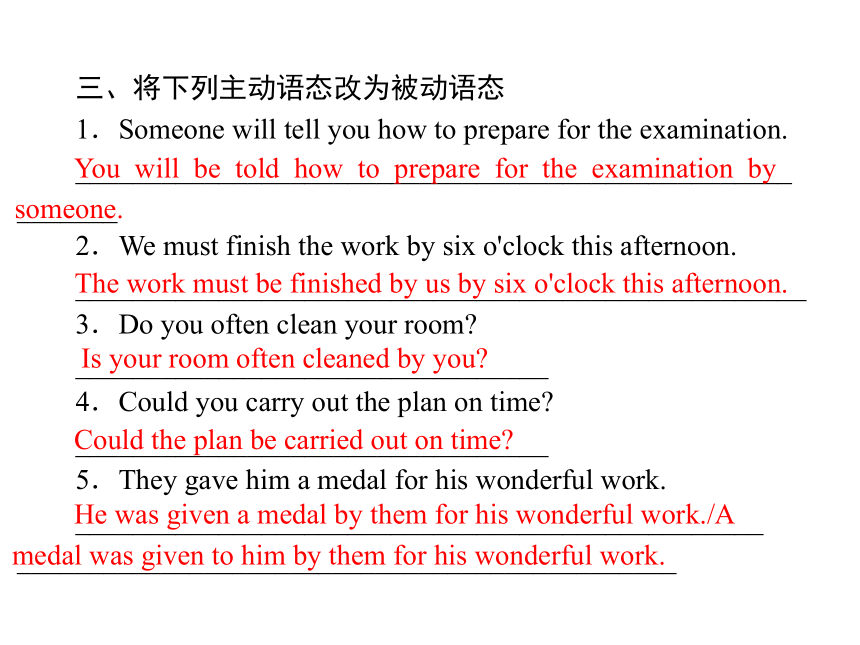
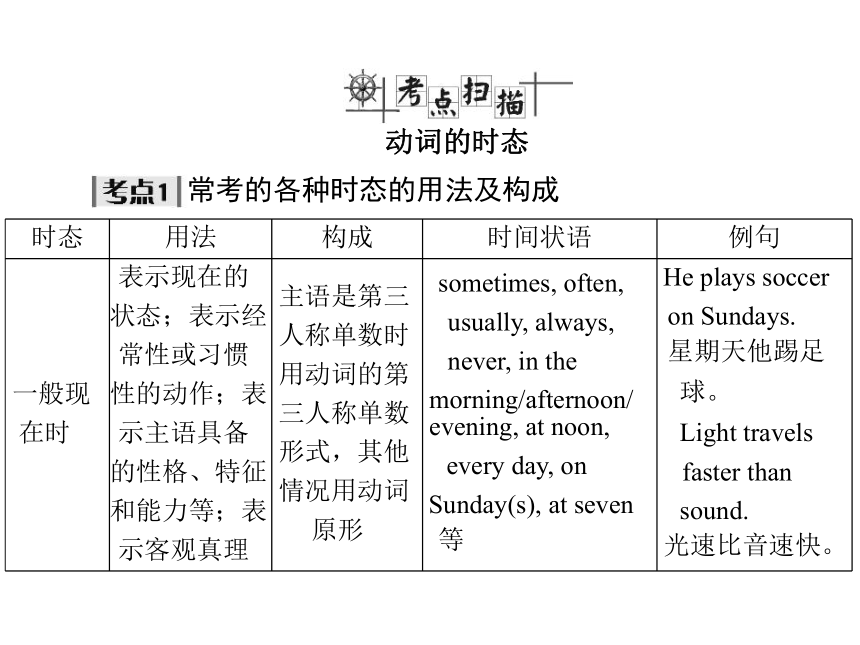
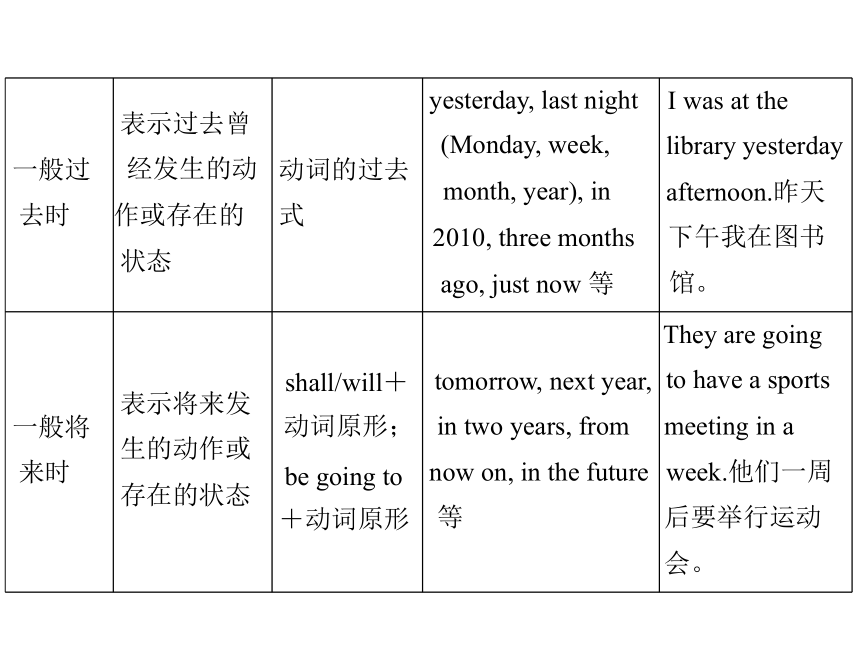
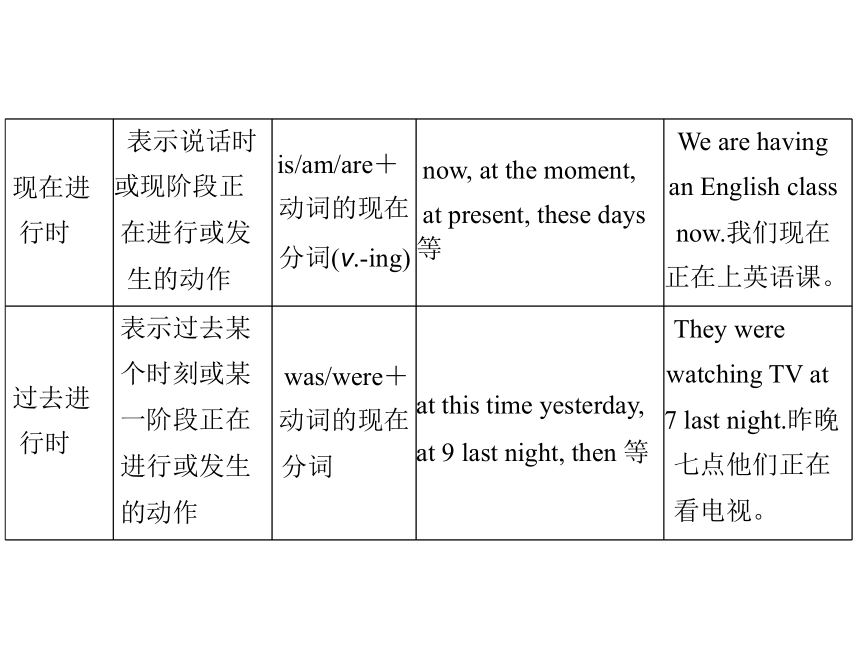
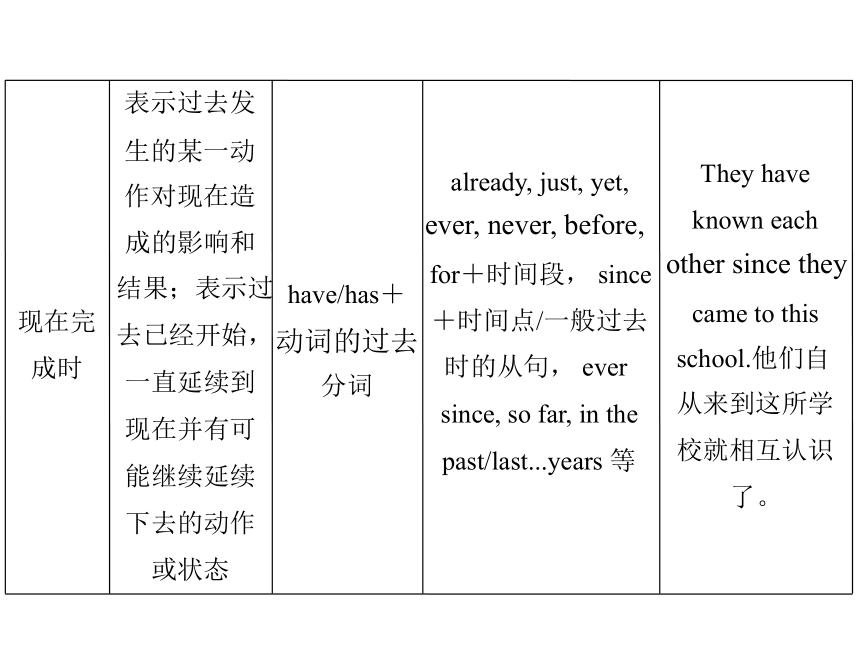
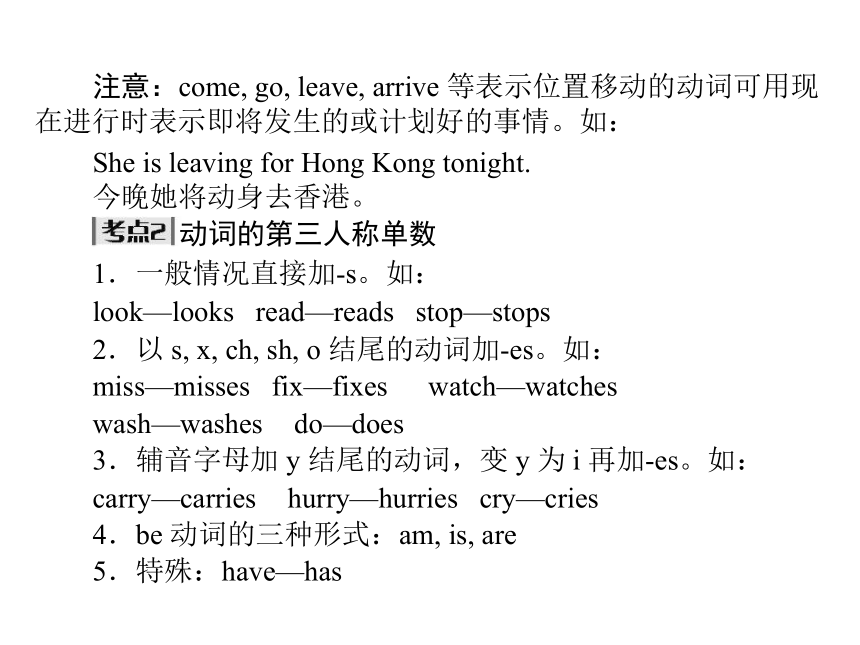
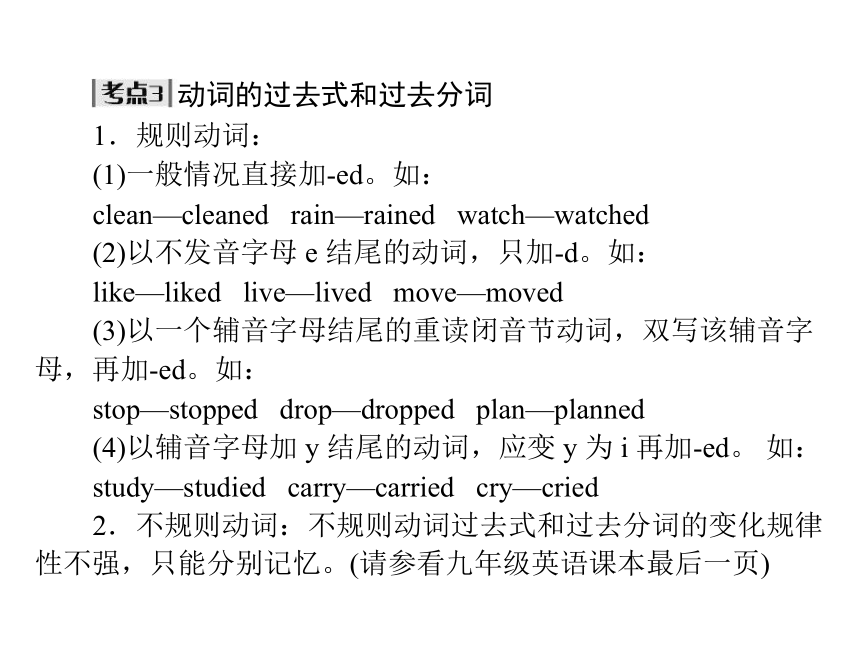
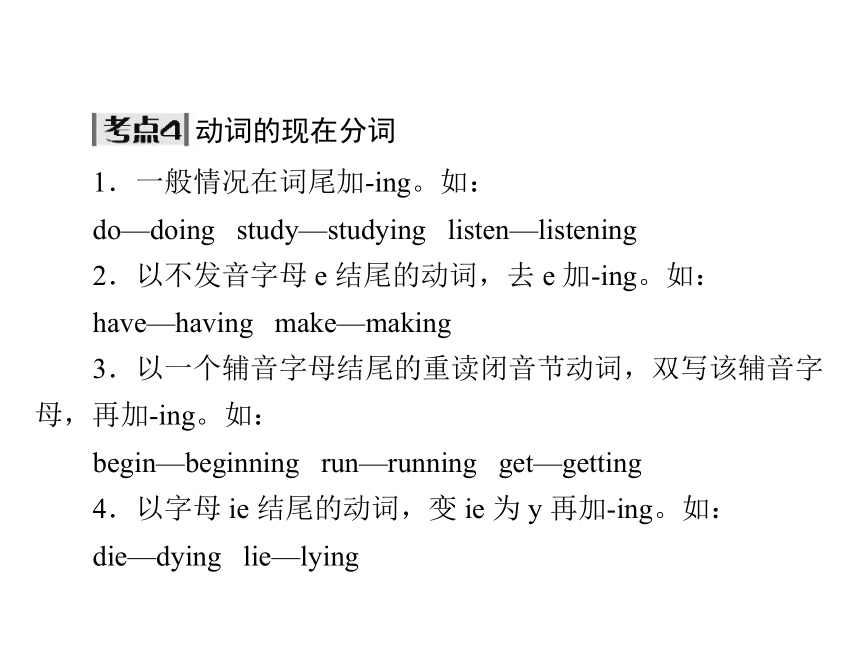
文档简介
课件40张PPT。第 8 讲 动词的时态和语态 一、写出下列动词的第三人称单数、过去式、过去分词和
现在分词1.play ______ ______ ______ ______playing2.go ______ _______ _______ _______3.study _______ ________ ________ ________studying4.have ______ ______ ______ ______having5.find ______ _______ ________ _________
6.teach ______ ______ _______ ________playsplayedplayedgoinggoeswentgonestudiesstudiedstudiedhashadhadfindingfindsfoundfoundteachingteachestaughttaught7.put ______ ______ ______ _______
8.speak ________ ________ ________ _________
9.learn _______ ________________ _____________ _______10.feel ______ _______ ______ ______feeling二、用所给动词的适当形式填空
1.Don't be noisy.Mum ________ (talk) with the guest in thesitting room.is talking2.—When ___ you ___ (buy) the e-dictionary?
—Last month.
3.—Why didn't you come and open the door for me, dear?
—Oh, sorry.I ___________ (cook) in the kitchen.I didn't hearyou.was cookingputtingputsputputspeakingspeaksspokespokenlearninglearnslearned/learntlearned/learntfeltfeelsfeltdidbuy4.He ______ (join) us in the discussion tomorrow.
5 .Henry speaks Chinese very well.He ________ (be) in Chinasince ten years ago.has been6 . Cindy will never drive the car because she _____ (hate)driving.hates7.English _________ (speak) in many countries.
8 . These magazines must not ________ (take) out of thereading room.be taken9.You _____________ (laugh) at if you wear that dress.10.What ________ (happen) in this area last night?happenedwill joinis spokenwill be laughed三、将下列主动语态改为被动语态1.Someone will tell you how to prepare for the examination._________________________________________________________2.We must finish the work by six o'clock this afternoon.___________________________________________________3.Do you often clean your room?_________________________________4.Could you carry out the plan on time?_________________________________5.They gave him a medal for his wonderful work.______________________________________________________________________________________________You will be told how to prepare for the examination bysomeone.The work must be finished by us by six o'clock this afternoon.Is your room often cleaned by you?Could the plan be carried out on time?He was given a medal by them for his wonderful work./Amedal was given to him by them for his wonderful work.动词的时态常考的各种时态的用法及构成现在完成时表示过去发作对现在造 成的影响和
结果;表示过
去已经开始,
一直延续到
现在并有可
能继续延续
下去的动作
或状态have/has+分词already, just, yet,生的某一动+时间点/一般过去
时的从句, ever
since, so far, in the
past/last...years 等They haveknown eachfor+时间段, since came to this
school.他们自
从来到这所学
校就相互认识
了。ever, never, before,other since they动词的过去 注意:come, go, leave, arrive 等表示位置移动的动词可用现
在进行时表示即将发生的或计划好的事情。如:
She is leaving for Hong Kong tonight.
今晚她将动身去香港。
动词的第三人称单数
1.一般情况直接加-s。如:
look—looks read—reads stop—stops
2.以 s, x, ch, sh, o 结尾的动词加-es。如:miss—misses fix—fixeswatch—watcheswash—washesdo—does3.辅音字母加 y 结尾的动词,变 y 为 i 再加-es。如:carry—carrieshurry—hurries cry—cries4.be 动词的三种形式:am, is, are
5.特殊:have—has动词的过去式和过去分词1.规则动词:(1)一般情况直接加-ed。如:clean—cleaned rain—rained watch—watched(2)以不发音字母 e 结尾的动词,只加-d。如:like—liked live—lived move—moved(3)以一个辅音字母结尾的重读闭音节动词,双写该辅音字母,再加-ed。如:stop—stopped drop—dropped plan—planned(4)以辅音字母加 y 结尾的动词,应变 y 为 i 再加-ed。 如:study—studied carry—carried cry—cried 2.不规则动词:不规则动词过去式和过去分词的变化规律
性不强,只能分别记忆。(请参看九年级英语课本最后一页)动词的现在分词1.一般情况在词尾加-ing。如:do—doing study—studying listen—listening2.以不发音字母 e 结尾的动词,去 e 加-ing。如:have—having make—making3.以一个辅音字母结尾的重读闭音节动词,双写该辅音字母,再加-ing。如:begin—beginning run—running get—getting4.以字母 ie 结尾的动词,变 ie 为 y 再加-ing。如:die—dying lie—lying 现在完成时中的一些重要用法
1.短暂性动词和延续性动词 短暂性动词可用于完成时态,说明某个动作的结果还存在,
但不能与表示一段时间的时间状语连用,也不能用于 how long
引导的特殊疑问句中。如需使用,此时要将短暂性动词转换为
延续性动词。如:borrow—keep
buy—havedie—be deadjoin—be a member of/be in
begin/start—be onfinish/end—be overcome/go/arrive—be in/at
leave—be away (from)
become—beopen—be openclose—be closed
sleep—be asleepmarry—be married
return—be back
get up—be up2.have/has gone to, have/has been to 和 have/has been in 的区别(1)have/has gone to 强调“在去某地的路上或在某地”,人还未回来。如:Has he gone to Qingdao?他去青岛了吗?(2)have/has been to 强调“去过某地”,人已经回来了。如:She has been to Shanghai before.
她以前曾经去过上海。(3)have/has been in 强调“一直待在某地”,常与一段时间连用。如:He has been in Shanghai for ten years.
他在上海十年了。3.现在完成时和一般过去时的区别 (1)现在完成时强调过去动作产生的结果对现在的影响,与
现在有关;一般过去时仅强调在过去某一时刻曾经发生的动作,
与现在无关。如:He has studied English for five years.他学英语五年了。(说明他现在还在学)He studied English for five years.他曾学过五年英语。(只说明他过去学过五年英语,但现在学不学就不知道了)(2)一般过去时常与具体的时间状语连用,而现在完成时常与模糊的时间状语连用,或无时间状语。被动语态 动词有两种语态:主动语态和被动语态。主动语态表示主
语是谓语动作的执行者;被动语态则表示主语是谓语动作的承
受者。中考考纲只要求考生掌握一般现在时、一般过去时、一
般将来时及含有情态动词的被动语态。被动语态的构成1.一般现在时的被动语态:肯定句:主语+am/is/are+过去分词+……否定句:主语+am/is/are+not+过去分词+……
一般疑问句:Am/Is/Are+主语+过去分词+……?2.一般过去时的被动语态:肯定句:主语+was/were+过去分词+……否定句:主语+was/were+not+过去分词+……
一般疑问句:Was/Were+主语+过去分词+……?
3.一般将来时的被动语态:肯定句:主语+will/shall+be+过去分词+……
否定句:主语+will/shall+not+be+过去分词+……
一般疑问句:Will/Shall+主语+be+过去分词+……?
4.含有情态动词的被动语态:肯定句:主语+情态动词+be+过去分词+……
否定句:主语+情态动词+not+be+过去分词+……
一般疑问句:情态动词+主语+be+过去分词+……?被动语态的用法1.当不知道或没必要说明动作的执行者时,用被动语态。如:Some new computers were stolen last night.
一些新电脑昨晚被盗了。This bridge was founded in 1981.这座桥于 1981 年竣工。 2.需强调或突出动作的承受者时常用被动语态。此时动作
的执行者由 by 引导且置于谓语动词之后,也可省略。如:The glass was broken by Mike.
玻璃杯是迈克打碎的。This book was written by him.这本书是他写的。3.当动作的执行者不是人时,多用被动语态。如:The whole village has been washed away by the flood.整个村庄都被洪水冲走了。The window was blown open by wind.
窗户被风吹开了。4.表示客观的说明常用“It is+过去分词+that 从句”句型。这类句型有:It is said that...据说……It is known to all that...众所周知……
It is reported that...据报道……
It is believed that...大家相信……5.为了使句子简练,上下文紧凑、连贯,常使用被动语态。如:Apples are good for health and are liked by almost everyone.苹果对健康有益,几乎被所有人喜欢。When he was five, he was taught how to swim.
五岁的时候,他就被教会如何游泳。6.文章的标题、广告、新闻等用语也常使用被动语态。如:
Teachers Wanted.招聘老师。(省略 are)
Road Blocked.道路堵塞。(省略 is)注意:不及物动词(短语)happen/take place, appear, disappear,come true, come out 等无被动语态。主动语态表示被动意义1 .系动词 look, sound, smell, taste, seem, turn, get, become等的主动结构表示被动意义(系动词无被动式)。如:The idea sounds great.这主意听起来不错。The flowers look beautiful.这些花看起来很漂亮。2.动词不定式作定语时常用主动形式表示被动意义。如:I have a lot of homework to do every day.
我每天都有很多作业要做。I have a letter to write.我有一封信要写。3.need doing (=need to be done)用主动形式表示被动意义。如:Our house needs painting.=Our house needs to be painted.
我们的房子需要粉刷了。( )1.(2011 年广东)—Alan, it's late.Why not go to bed?—Jenny hasn't come back yet.I ________ for her.CA.waited
C.am waitingB.have waited
D.was waiting 解析:由题意可知是“正在等她”,且由“it's late”可知表
示现在,故用现在进行时。()2.(2011 年广东)People who drink wine ________ to driveafter May Day.D 解析:题意:“5.1”节之后喝了酒的人不(可以)被允许开车。
由题意可知应用被动语态,B 项主谓不一致,故选 D。A.don't allow
B.isn't allowed
C.mustn't allow
D.mustn't be allowed
()3.(2011 年广东)Our math teacher ________ in our school
解析:题意:我们数学老师在我们学校教书 20 年了,当他
23 岁的时候他就来到这里了。由 for 20 years 可知,动作从 20
年前持续到现在,故要用现在完成时;由“when he was 23 years
old”时间状语从句可知,动作发生在 23 岁时,故要用一般过去
时。选 D。for 20 years and he ________ here when he was 23 years old.
A.has taught; has come
B.taught; comes
C.taught; came
D.has taught; cameD()4.(2011 年广东广州)Yesterday evening, I ______ alongthe street when I suddenly met my maths teacher.CA.walk
C.was walkingB.walked
D.am walking 解析:题意:昨天晚上我正沿着街道散步,突然遇到我的
数学老师。“散步”这个动作是遇到老师时正在进行的,故用
过去进行时。()5.(2011 年广东佛山)The Chinese Culture Day ________in New York City on April 20th, 2011.C 解析:“on April 20th, 2011”表示的是过去时间,celebrate 与
the Chinese Culture Day 是动宾关系,故用一般过去时的被动语
态。A.celebrated
B.is celebrated
C.was celebrated()6.(2011 年 广 东 佛 山 )Most of the sandstorms in ourcountry ________ in spring, from March to May.AA.happenB.happensC.is happening 解析:由时间状语“in spring, from March to May”可知时态
是一般现在时,且主语为复数,故选 A。()7.(2011 年 广 东 佛 山 )The Guangzhou Tower ________thousands of tourists since it was open to the public.CA.attractsB.attractedC.has attracted 解析:由时间状语“since it was open to the public”可知应用
现在完成时。( )8.(2011 年广东深圳)—When should I hand in my paper?—Your paper must ________ as soon as the bell ________. A.hand in; ringsB.hand in; will ringC.be handed in; will ring
D.be handed in; rings 解析:hand in 与 paper 之间是动宾关系,故第一空用被动
语态;as soon as 引导的时间状语从句中,从句用一般现在时表
示将来,故选 D。D()9.(2011 年广东梅州)The boss made him work 14 hours aday.That means, he ________ work 14 hours a day.DA.was made
C.was makingB.made
D.was made to 解析:由前一句可知“他被迫每天工作 14 个小时”,且前
一句的谓语动词 made 是一般过去时,故用一般过去时的被动
语态。make sb.do 的被动语态要加上省略的 to,即 be made to do。
故选 D。( )10.(2011 年广东肇庆)—Your classroom is very clean.—Yes, it ________ every day.AA.is cleanedB.cleansC.is cleaning 解析:由时间状语 every day 可知要用一般现在时,且 it(即
your classroom)是 clean 这一动作的承担者,故用一般现在时的
被动语态,选 A。
A.has begunB.has been onC.began 解析:由时间状语 since half an hour ago 可知用现在完成时,
且 begin 为短暂性动词,不能与一段时间连用,故用 be on。选
B。 ( )11.(2011 年广东肇庆)You are too late.The film ________
since half an hour ago.B()12.(2011 年 广 东 清 远 )Echo ________ for half amonth.She'll come back in two months.
A.left
C.has left
B.leave
D.has been away 解析:时间状语 for half a month 为一段时间,故谓语动词
要用延续性动词;且由后一句“她将两个月后回来”说明已经
离开,应用现在完成时态。故选 D。D()13.(2010 年广东)Robert with his two kids ______ to thebeach for vacation every year.
A.go
C.went
B.goes
D.are going 解析:由时间状语 every year 可知用一般现在时;句中的
“with his two kids”为伴随状语,主语为前面的 Robert,故谓语
动词只能用第三人称单数 goes。BC( )14.(2010 年广东)—Do you know her well?
—Sure.We ________ friends since ten years ago.A.were
C.have beenB.have made
D.have become 解析:根据后面的 since ten years ago 可知用现在完成时,
且 make 和 become 均为短暂性动词,不能与一段时间连用,故
用 have been。()15.(2010 年 广 东 )The 16th Asian Games ________ inGuangzhou in November, 2010.
A.holds
C.was held
B.will hold
D.will be held 解析:由时间状语“in November, 2010”可知要用将来时态,
且 Asian Games 是 hold 这一动作的承担者,故用一般将来时的
被动语态。选 D。D()16.(2010 年 广 东 深 圳 )—Have you ever ________Australia?A
解析:题意:“你曾经去过澳大利亚吗?”“是的。跟袋
鼠一起玩真的很有趣。”由题意可知表示“去过某地”,现在
已经回来了,故用 have been to;固定句型 it is interesting to do sth.
意为“做某事很有趣”。—Yes, I have.It's really interesting ________ with kangaroos.
A.been to; to play
B.gone to; played
C.been to; play
D.gone to; playing( )17.(2010 年广东梅州)—May I speak to John?B
解析:由答语可知“去日本了还没回来”,可知要用 has
gone to;由时间状语 in two days 及题意可知要用一般将来时的
肯定式,故选 B。—Sorry, he ________ Japan.But he ________ in two days.
A.has been to; will come back
B.has gone to; will be back
C.has been in; would come back
D.has gone to; won't come back()18.(2010 年 广 东 肇 庆 )According to the library rules,Cbooks ________ for two weeks at most.
A.can be borrowedB.can keep
解析:borrow 是短暂性动词,不能与 for two weeks 连用,
故要用延续性动词 keep; keep 与 books 是动宾关系,故用被动
语态,选 C。
A.usesB.is usedC.is usingD.used解析:it(指 cleaner)与 use 之间是动宾关系,故用被动语态。C.can be kept( )19.(2010 年广东广州)—Excuse me, what's this for?
—It's a cleaner and it ________ to pick up dirt.B(year.)20.(2010 年广东湛江)—I heard that Mr.Brown died last
—Yes, he has ________ for a year, but we still miss him.A.been dead
C.diedB.death
D.dying 解析:由 for a year 可知要用延续性动词,故用 been dead;
death 为名词,dying 为现在分词,均不符合。
A.finishB.will finishC.have finished 解析:由后一句“我们去喝杯咖啡吧”可知“我已经完成
了工作”,故用现在完成时。 ( )21.(2010 年广东佛山)I ________ my work today.Let's go
for a coffee.AC()22.(2010 年 广 东 佛 山 )Experts ________ to makesuggestions to help the city develop.
A.will invite
B.are invited
解析:experts 与 invite 之间是动宾关系,故用被动语态。C.have invitedB
现在分词1.play ______ ______ ______ ______playing2.go ______ _______ _______ _______3.study _______ ________ ________ ________studying4.have ______ ______ ______ ______having5.find ______ _______ ________ _________
6.teach ______ ______ _______ ________playsplayedplayedgoinggoeswentgonestudiesstudiedstudiedhashadhadfindingfindsfoundfoundteachingteachestaughttaught7.put ______ ______ ______ _______
8.speak ________ ________ ________ _________
9.learn _______ ________________ _____________ _______10.feel ______ _______ ______ ______feeling二、用所给动词的适当形式填空
1.Don't be noisy.Mum ________ (talk) with the guest in thesitting room.is talking2.—When ___ you ___ (buy) the e-dictionary?
—Last month.
3.—Why didn't you come and open the door for me, dear?
—Oh, sorry.I ___________ (cook) in the kitchen.I didn't hearyou.was cookingputtingputsputputspeakingspeaksspokespokenlearninglearnslearned/learntlearned/learntfeltfeelsfeltdidbuy4.He ______ (join) us in the discussion tomorrow.
5 .Henry speaks Chinese very well.He ________ (be) in Chinasince ten years ago.has been6 . Cindy will never drive the car because she _____ (hate)driving.hates7.English _________ (speak) in many countries.
8 . These magazines must not ________ (take) out of thereading room.be taken9.You _____________ (laugh) at if you wear that dress.10.What ________ (happen) in this area last night?happenedwill joinis spokenwill be laughed三、将下列主动语态改为被动语态1.Someone will tell you how to prepare for the examination._________________________________________________________2.We must finish the work by six o'clock this afternoon.___________________________________________________3.Do you often clean your room?_________________________________4.Could you carry out the plan on time?_________________________________5.They gave him a medal for his wonderful work.______________________________________________________________________________________________You will be told how to prepare for the examination bysomeone.The work must be finished by us by six o'clock this afternoon.Is your room often cleaned by you?Could the plan be carried out on time?He was given a medal by them for his wonderful work./Amedal was given to him by them for his wonderful work.动词的时态常考的各种时态的用法及构成现在完成时表示过去发作对现在造 成的影响和
结果;表示过
去已经开始,
一直延续到
现在并有可
能继续延续
下去的动作
或状态have/has+分词already, just, yet,生的某一动+时间点/一般过去
时的从句, ever
since, so far, in the
past/last...years 等They haveknown eachfor+时间段, since came to this
school.他们自
从来到这所学
校就相互认识
了。ever, never, before,other since they动词的过去 注意:come, go, leave, arrive 等表示位置移动的动词可用现
在进行时表示即将发生的或计划好的事情。如:
She is leaving for Hong Kong tonight.
今晚她将动身去香港。
动词的第三人称单数
1.一般情况直接加-s。如:
look—looks read—reads stop—stops
2.以 s, x, ch, sh, o 结尾的动词加-es。如:miss—misses fix—fixeswatch—watcheswash—washesdo—does3.辅音字母加 y 结尾的动词,变 y 为 i 再加-es。如:carry—carrieshurry—hurries cry—cries4.be 动词的三种形式:am, is, are
5.特殊:have—has动词的过去式和过去分词1.规则动词:(1)一般情况直接加-ed。如:clean—cleaned rain—rained watch—watched(2)以不发音字母 e 结尾的动词,只加-d。如:like—liked live—lived move—moved(3)以一个辅音字母结尾的重读闭音节动词,双写该辅音字母,再加-ed。如:stop—stopped drop—dropped plan—planned(4)以辅音字母加 y 结尾的动词,应变 y 为 i 再加-ed。 如:study—studied carry—carried cry—cried 2.不规则动词:不规则动词过去式和过去分词的变化规律
性不强,只能分别记忆。(请参看九年级英语课本最后一页)动词的现在分词1.一般情况在词尾加-ing。如:do—doing study—studying listen—listening2.以不发音字母 e 结尾的动词,去 e 加-ing。如:have—having make—making3.以一个辅音字母结尾的重读闭音节动词,双写该辅音字母,再加-ing。如:begin—beginning run—running get—getting4.以字母 ie 结尾的动词,变 ie 为 y 再加-ing。如:die—dying lie—lying 现在完成时中的一些重要用法
1.短暂性动词和延续性动词 短暂性动词可用于完成时态,说明某个动作的结果还存在,
但不能与表示一段时间的时间状语连用,也不能用于 how long
引导的特殊疑问句中。如需使用,此时要将短暂性动词转换为
延续性动词。如:borrow—keep
buy—havedie—be deadjoin—be a member of/be in
begin/start—be onfinish/end—be overcome/go/arrive—be in/at
leave—be away (from)
become—beopen—be openclose—be closed
sleep—be asleepmarry—be married
return—be back
get up—be up2.have/has gone to, have/has been to 和 have/has been in 的区别(1)have/has gone to 强调“在去某地的路上或在某地”,人还未回来。如:Has he gone to Qingdao?他去青岛了吗?(2)have/has been to 强调“去过某地”,人已经回来了。如:She has been to Shanghai before.
她以前曾经去过上海。(3)have/has been in 强调“一直待在某地”,常与一段时间连用。如:He has been in Shanghai for ten years.
他在上海十年了。3.现在完成时和一般过去时的区别 (1)现在完成时强调过去动作产生的结果对现在的影响,与
现在有关;一般过去时仅强调在过去某一时刻曾经发生的动作,
与现在无关。如:He has studied English for five years.他学英语五年了。(说明他现在还在学)He studied English for five years.他曾学过五年英语。(只说明他过去学过五年英语,但现在学不学就不知道了)(2)一般过去时常与具体的时间状语连用,而现在完成时常与模糊的时间状语连用,或无时间状语。被动语态 动词有两种语态:主动语态和被动语态。主动语态表示主
语是谓语动作的执行者;被动语态则表示主语是谓语动作的承
受者。中考考纲只要求考生掌握一般现在时、一般过去时、一
般将来时及含有情态动词的被动语态。被动语态的构成1.一般现在时的被动语态:肯定句:主语+am/is/are+过去分词+……否定句:主语+am/is/are+not+过去分词+……
一般疑问句:Am/Is/Are+主语+过去分词+……?2.一般过去时的被动语态:肯定句:主语+was/were+过去分词+……否定句:主语+was/were+not+过去分词+……
一般疑问句:Was/Were+主语+过去分词+……?
3.一般将来时的被动语态:肯定句:主语+will/shall+be+过去分词+……
否定句:主语+will/shall+not+be+过去分词+……
一般疑问句:Will/Shall+主语+be+过去分词+……?
4.含有情态动词的被动语态:肯定句:主语+情态动词+be+过去分词+……
否定句:主语+情态动词+not+be+过去分词+……
一般疑问句:情态动词+主语+be+过去分词+……?被动语态的用法1.当不知道或没必要说明动作的执行者时,用被动语态。如:Some new computers were stolen last night.
一些新电脑昨晚被盗了。This bridge was founded in 1981.这座桥于 1981 年竣工。 2.需强调或突出动作的承受者时常用被动语态。此时动作
的执行者由 by 引导且置于谓语动词之后,也可省略。如:The glass was broken by Mike.
玻璃杯是迈克打碎的。This book was written by him.这本书是他写的。3.当动作的执行者不是人时,多用被动语态。如:The whole village has been washed away by the flood.整个村庄都被洪水冲走了。The window was blown open by wind.
窗户被风吹开了。4.表示客观的说明常用“It is+过去分词+that 从句”句型。这类句型有:It is said that...据说……It is known to all that...众所周知……
It is reported that...据报道……
It is believed that...大家相信……5.为了使句子简练,上下文紧凑、连贯,常使用被动语态。如:Apples are good for health and are liked by almost everyone.苹果对健康有益,几乎被所有人喜欢。When he was five, he was taught how to swim.
五岁的时候,他就被教会如何游泳。6.文章的标题、广告、新闻等用语也常使用被动语态。如:
Teachers Wanted.招聘老师。(省略 are)
Road Blocked.道路堵塞。(省略 is)注意:不及物动词(短语)happen/take place, appear, disappear,come true, come out 等无被动语态。主动语态表示被动意义1 .系动词 look, sound, smell, taste, seem, turn, get, become等的主动结构表示被动意义(系动词无被动式)。如:The idea sounds great.这主意听起来不错。The flowers look beautiful.这些花看起来很漂亮。2.动词不定式作定语时常用主动形式表示被动意义。如:I have a lot of homework to do every day.
我每天都有很多作业要做。I have a letter to write.我有一封信要写。3.need doing (=need to be done)用主动形式表示被动意义。如:Our house needs painting.=Our house needs to be painted.
我们的房子需要粉刷了。( )1.(2011 年广东)—Alan, it's late.Why not go to bed?—Jenny hasn't come back yet.I ________ for her.CA.waited
C.am waitingB.have waited
D.was waiting 解析:由题意可知是“正在等她”,且由“it's late”可知表
示现在,故用现在进行时。()2.(2011 年广东)People who drink wine ________ to driveafter May Day.D 解析:题意:“5.1”节之后喝了酒的人不(可以)被允许开车。
由题意可知应用被动语态,B 项主谓不一致,故选 D。A.don't allow
B.isn't allowed
C.mustn't allow
D.mustn't be allowed
()3.(2011 年广东)Our math teacher ________ in our school
解析:题意:我们数学老师在我们学校教书 20 年了,当他
23 岁的时候他就来到这里了。由 for 20 years 可知,动作从 20
年前持续到现在,故要用现在完成时;由“when he was 23 years
old”时间状语从句可知,动作发生在 23 岁时,故要用一般过去
时。选 D。for 20 years and he ________ here when he was 23 years old.
A.has taught; has come
B.taught; comes
C.taught; came
D.has taught; cameD()4.(2011 年广东广州)Yesterday evening, I ______ alongthe street when I suddenly met my maths teacher.CA.walk
C.was walkingB.walked
D.am walking 解析:题意:昨天晚上我正沿着街道散步,突然遇到我的
数学老师。“散步”这个动作是遇到老师时正在进行的,故用
过去进行时。()5.(2011 年广东佛山)The Chinese Culture Day ________in New York City on April 20th, 2011.C 解析:“on April 20th, 2011”表示的是过去时间,celebrate 与
the Chinese Culture Day 是动宾关系,故用一般过去时的被动语
态。A.celebrated
B.is celebrated
C.was celebrated()6.(2011 年 广 东 佛 山 )Most of the sandstorms in ourcountry ________ in spring, from March to May.AA.happenB.happensC.is happening 解析:由时间状语“in spring, from March to May”可知时态
是一般现在时,且主语为复数,故选 A。()7.(2011 年 广 东 佛 山 )The Guangzhou Tower ________thousands of tourists since it was open to the public.CA.attractsB.attractedC.has attracted 解析:由时间状语“since it was open to the public”可知应用
现在完成时。( )8.(2011 年广东深圳)—When should I hand in my paper?—Your paper must ________ as soon as the bell ________. A.hand in; ringsB.hand in; will ringC.be handed in; will ring
D.be handed in; rings 解析:hand in 与 paper 之间是动宾关系,故第一空用被动
语态;as soon as 引导的时间状语从句中,从句用一般现在时表
示将来,故选 D。D()9.(2011 年广东梅州)The boss made him work 14 hours aday.That means, he ________ work 14 hours a day.DA.was made
C.was makingB.made
D.was made to 解析:由前一句可知“他被迫每天工作 14 个小时”,且前
一句的谓语动词 made 是一般过去时,故用一般过去时的被动
语态。make sb.do 的被动语态要加上省略的 to,即 be made to do。
故选 D。( )10.(2011 年广东肇庆)—Your classroom is very clean.—Yes, it ________ every day.AA.is cleanedB.cleansC.is cleaning 解析:由时间状语 every day 可知要用一般现在时,且 it(即
your classroom)是 clean 这一动作的承担者,故用一般现在时的
被动语态,选 A。
A.has begunB.has been onC.began 解析:由时间状语 since half an hour ago 可知用现在完成时,
且 begin 为短暂性动词,不能与一段时间连用,故用 be on。选
B。 ( )11.(2011 年广东肇庆)You are too late.The film ________
since half an hour ago.B()12.(2011 年 广 东 清 远 )Echo ________ for half amonth.She'll come back in two months.
A.left
C.has left
B.leave
D.has been away 解析:时间状语 for half a month 为一段时间,故谓语动词
要用延续性动词;且由后一句“她将两个月后回来”说明已经
离开,应用现在完成时态。故选 D。D()13.(2010 年广东)Robert with his two kids ______ to thebeach for vacation every year.
A.go
C.went
B.goes
D.are going 解析:由时间状语 every year 可知用一般现在时;句中的
“with his two kids”为伴随状语,主语为前面的 Robert,故谓语
动词只能用第三人称单数 goes。BC( )14.(2010 年广东)—Do you know her well?
—Sure.We ________ friends since ten years ago.A.were
C.have beenB.have made
D.have become 解析:根据后面的 since ten years ago 可知用现在完成时,
且 make 和 become 均为短暂性动词,不能与一段时间连用,故
用 have been。()15.(2010 年 广 东 )The 16th Asian Games ________ inGuangzhou in November, 2010.
A.holds
C.was held
B.will hold
D.will be held 解析:由时间状语“in November, 2010”可知要用将来时态,
且 Asian Games 是 hold 这一动作的承担者,故用一般将来时的
被动语态。选 D。D()16.(2010 年 广 东 深 圳 )—Have you ever ________Australia?A
解析:题意:“你曾经去过澳大利亚吗?”“是的。跟袋
鼠一起玩真的很有趣。”由题意可知表示“去过某地”,现在
已经回来了,故用 have been to;固定句型 it is interesting to do sth.
意为“做某事很有趣”。—Yes, I have.It's really interesting ________ with kangaroos.
A.been to; to play
B.gone to; played
C.been to; play
D.gone to; playing( )17.(2010 年广东梅州)—May I speak to John?B
解析:由答语可知“去日本了还没回来”,可知要用 has
gone to;由时间状语 in two days 及题意可知要用一般将来时的
肯定式,故选 B。—Sorry, he ________ Japan.But he ________ in two days.
A.has been to; will come back
B.has gone to; will be back
C.has been in; would come back
D.has gone to; won't come back()18.(2010 年 广 东 肇 庆 )According to the library rules,Cbooks ________ for two weeks at most.
A.can be borrowedB.can keep
解析:borrow 是短暂性动词,不能与 for two weeks 连用,
故要用延续性动词 keep; keep 与 books 是动宾关系,故用被动
语态,选 C。
A.usesB.is usedC.is usingD.used解析:it(指 cleaner)与 use 之间是动宾关系,故用被动语态。C.can be kept( )19.(2010 年广东广州)—Excuse me, what's this for?
—It's a cleaner and it ________ to pick up dirt.B(year.)20.(2010 年广东湛江)—I heard that Mr.Brown died last
—Yes, he has ________ for a year, but we still miss him.A.been dead
C.diedB.death
D.dying 解析:由 for a year 可知要用延续性动词,故用 been dead;
death 为名词,dying 为现在分词,均不符合。
A.finishB.will finishC.have finished 解析:由后一句“我们去喝杯咖啡吧”可知“我已经完成
了工作”,故用现在完成时。 ( )21.(2010 年广东佛山)I ________ my work today.Let's go
for a coffee.AC()22.(2010 年 广 东 佛 山 )Experts ________ to makesuggestions to help the city develop.
A.will invite
B.are invited
解析:experts 与 invite 之间是动宾关系,故用被动语态。C.have invitedB
同课章节目录
- 词法
- 名词
- 动词和动词短语
- 动词语态
- 动词时态
- 助动词和情态动词
- 非谓语动词
- 冠词
- 代词
- 数词和量词
- 形容词副词及其比较等级
- 介词和介词短语
- 连词和感叹词
- 构词法
- 相似、相近词比较
- 句法
- 陈述句
- 一般疑问句和否定疑问句
- 特殊疑问句及选择疑问句
- 反意疑问句
- 存在句(There be句型)
- 宾语从句
- 定语从句
- 状语从句
- 主谓一致问题
- 简单句
- 并列句
- 复合句
- 主谓一致
- 主、表语从句
- 名词性从句
- 直接引语和间接引语
- 虚拟语气
- 感叹句
- 强调句
- 倒装句
- 祈使句
- 句子的成分
- 句子的分类
- 题型专区
- 单项选择部分
- 易错题
- 完形填空
- 阅读理解
- 词汇练习
- 听说训练
- 句型转换
- 补全对话
- 短文改错
- 翻译
- 书面表达
- 任务型阅读
- 语法填空
- 其他资料
